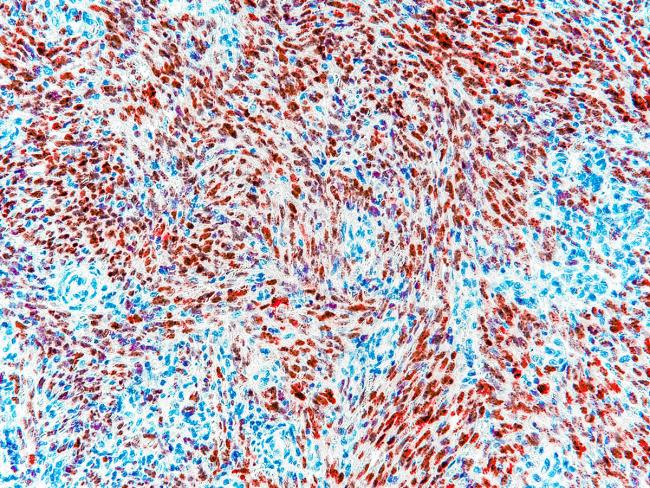
The Bold Leap Forward: AI-Powered Childhood Cancer Research Revolution
Today, a powerful wind of change blows through the halls of the U.S. Department of Health and Human Services (HHS) as they announce a groundbreaking shift in their approach to childhood cancer research. The budget for the Childhood Cancer Data Initiative (CCDI) at the National Institutes of Health (NIH) has been doubled from $50 million to $100 million. This surge in funding aims to revolutionize how the nation tackles pediatric cancer by using advanced artificial intelligence to bring better diagnostics, treatments, and preventive strategies within reach.
The CCDI, established by President Trump back in 2019, serves as a hub for collecting and analyzing childhood cancer data. Today's announcement not only infuses more resources into the initiative but also invites private-sector collaboration to supercharge efforts with cutting-edge AI technology. As Health and Human Services Secretary Robert F. Kennedy, Jr. passionately declares, "President Trump is changing that. We will harness American innovation in artificial intelligence to find cures for pediatric cancer."
Artificial intelligence is being embraced as the secret weapon in understanding and combating these complex diseases. The NIH leverages AI's ability to delve into electronic health records and claims data, thus crafting more insightful research and clinical trials. As NIH Director Jay Bhattacharya so aptly stated, "By doubling down on this mission with AI, we are ensuring that state-of-the-art science is being leveraged to provide answers about these diseases that would otherwise be out of reach."
This initiative is especially crucial when considering the grim reality: pediatric cancer remains the leading cause of disease-related death among children in the United States, with incidence rates soaring by over 40% since 1975. The partnership with AI not only promises to decode the mysteries of childhood cancers but to also foster early detection and prevention efforts, reshaping the future for children, teens, and young adults.
Scientific Breakthrough: Understanding Viral Expression in Pediatric Cancers
The research landscape extends beyond data analysis to encompass the intricate world of viral expression in pediatric cancers. Scientists are now focusing on the fascinating dance within a microscopic universe, particularly in rare cases of Kaposi Sarcoma among children. The spotlight falls on the Latency-Associated Nuclear Antigen (LANA) expressed by HHV-8, a virus that typically lies dormant in the body, much like a secret spy waiting to reveal its secrets.
Through advanced immunohistochemical staining techniques, researchers can visualize the action within biopsies from young patients. Here, the LANA stands out in vibrant dark red, marking its presence within the nuclei of cancer cells, a spectacle only microscopes can reveal at striking magnifications. This imagery represents more than scientific discovery—it embodies the promise of survival and improved patient outcomes through meticulous research conducted by dedicated scientists at comprehensive cancer centers across the nation.
Presidential Commitment and Strategic Vision
In a powerful move reminiscent of a bold stroke on history's canvas, the presidential administration has transformed its vision into concrete action. With the backdrop of the White House, Health and Human Services Secretary Robert F. Kennedy, Jr., NIH Director Jay Bhattacharya, and National Cancer Institute (NCI) Director Anthony Letai stood united with President Trump to fortify their pledge to eradicate childhood cancer. The moment was encapsulated by the signing of the executive order, "Unlocking Cures for Pediatric Cancer with Artificial Intelligence."
"For too long, families have fought childhood cancer while our systems lagged behind," declared Secretary Kennedy during the significant White House event. The administration's unwavering commitment reflects a response to the urgent need for action, as pediatric cancer statistics paint a sobering picture of the challenges ahead.
The efforts are deeply personal and penetrating, with NCI Director Anthony Letai affirming, "I cannot think of a better way to begin my tenure at NCI than to redouble our efforts to support our youngest patients and their families facing rare leukemias and other cancers. We will not stop until childhood cancer is a thing of the past." The initiative emphasizes that parents maintain control over their child's health information, ensuring that data utilization aligns with both patient privacy and research benefits.
Technology Integration and Future Prospects
The transformative power of artificial intelligence allows HHS to employ electronic health record and claims data effectively to inform research and clinical trials. By engaging private-sector partners, the initiative leverages AI to rapidly unlock cures, bringing cutting-edge technology into the realm of cancer research. Through AI, laborious data analysis processes are supercharged, enabling researchers to uncover patterns and insights that were previously out of reach.
The strategic focus is directed by comprehensive planning that emphasizes AI-driven research to uncover cancer's causes and early risks. This technology integration promises to seamlessly merge innovation with care, safeguarding sensitive information while propelling research forward. The application of AI offers a powerful tool to address current challenges, enabling precise understanding and risk prediction to prevent cancer in its earliest stages.
As the National Cancer Institute takes center stage with the expansion of its capabilities, this leap forward marks a significant turning point. The CCDI stands as a beacon of hope in the broader mission to diminish the prevalence of cancer and enhance the quality of life for patients through extensive research spanning basic science to clinical application. This new chapter in the battle against childhood cancer ushers in a future where science, technology, and human resolve harmoniously unite to transform the narrative forever, signaling a future where childhood cancer could very well be relegated to the history books.







